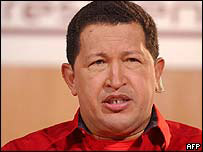 |
 |
 |
 News from Around the Americas | June 2005 News from Around the Americas | June 2005  
US behind Bolivia Crisis - Chavez
 BBC News BBC News


| | Capitalism is the road to destabilisation, violence and war between brothers President Hugo Chavez. (Photo: The BBC) |
Venezuelan President Hugo Chavez has blamed Washington's brand of capitalism for the recent troubles in Bolivia.

Speaking on his weekly TV programme, he said US open market policies in Latin America had led to "exclusion, misery and destabilisation."

He called President George W Bush's proposal for a regional free trade agreement a "medicine of death".

Bolivia was brought to a virtual standstill by protesters calling for economic and constitutional reforms.

"Look at Bolivia. Fortunately the Bolivians opened the door toward a peaceful path, but they were on the verge of a civil war," said Mr Chavez.

'Interference'

The Venezuelan leader, who is an outspoken critic of Mr Bush's foreign policy, was responding to suggestions by some US officials that he was stirring up the Bolivian protests.

US assistant secretary of state Roger Noriega said President Chavez's support for the Bolivian indigenous leader Evo Morales might be partly to blame for the mass protests there.

Capitalism is the road to destabilisation, violence and war between brothers President Hugo Chavez.

But a report in the Argentinian newspaper Clarin quoted unnamed diplomatic sources as saying that Mr Chavez may have played a key part in achieving a solution to Bolivia's crisis.

The report said that a frenetic exchange of phone calls with Caracas encouraged Mr Morales to accept the constitutional outcome.

Clarin also carried an interview with former Bolivian President Carlos Mesa, who said that although the sympathy between Mr Chavez and Mr Morales was widely known, he had not seen any evidence of Venezuelan interference.

Mr Mesa's predecessor as president, Gonzalo Sanchez de Lozada, who was ousted in 2003, told the BBC on Monday he blamed Colombian drug trade interests for stirring up division in Bolivia with an eye to controlling cocaine production there.

'No, Mr Bush'

During his programme on Sunday, which lasted more than seven hours, Mr Chavez said Latin American countries were moving towards socialist economic models instead of US-style capitalism.

He said Mr Bush's idea for a hemisphere-wide free trade zone, mooted last week at a meeting of the Organisation of American States in Florida, would lead to more poverty and protests in the region.

"We say no Mr Bush, no sir... I'm sorry for you," he said. "The people of Latin America are saying 'no' to you, Mr Danger, they are saying no to your medicine."

"Capitalism is the road to destabilisation, violence and war between brothers."

The blockades in Bolivia starved the capital La Paz of fuel and food, and forced the resignation of President Mesa last Thursday.

He was replaced by Eduardo Rodriguez, who on Sunday met representatives of the protesters. They have now put their action on hold.

They told Mr Rodriguez that they would maintain the truce if he agreed to demands to nationalise the natural gas industry and increase political representation for the country's Indian majority. | 
 | |
 |



